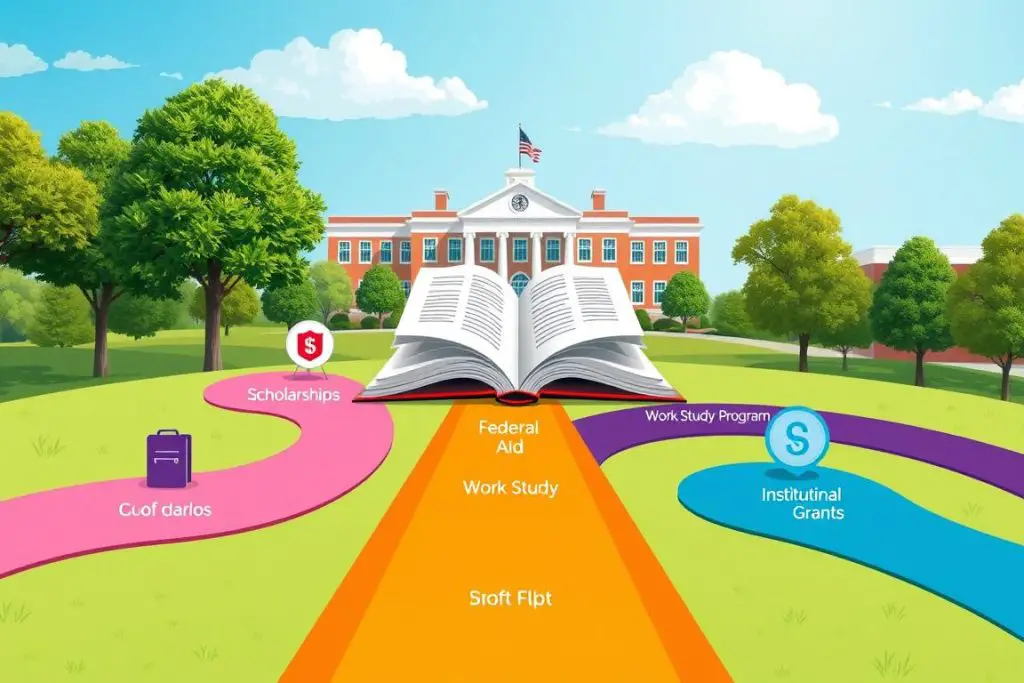As the cost of higher education rises, getting a college degree can feel like climbing Mount Everest financially. Educational grants serve as a lifeline against the steep costs of tuition and books. They are not just financial help; they open up worlds of opportunity for those who are determined. Grants let you reach your academic goals without the burden of debt holding you back.
Finding different educational funding options can change your educational journey from giving up to fully engaging. There’s ‘free money’ available yearly that goes unnoticed, aiming to cover costs from lab fees to living expenses. Grants are the unsung heroes in the world of educational finance, providing hope, support, and a brighter future.
See this as your wake-up call to start looking for educational grants. This search costs nothing but offers everything you need to support your studies. Although finding grants may seem complex, your persistence will uncover the resources to move forward in higher education without worrying about debt after graduation.
Key Takeaways
- Grants are vital non-repayable financial aid for education that lessen the burden of college costs.
- Diligence in searching and applying for grants can fundamentally alter the financial landscape of your college experience.
- Educational grants range from a modest book stipend to comprehensive full-ride packages.
- Exploring federal, state, and private educational funding options is crucial in diversifying your financial support.
- Applying for educational grants can be a strategic move to avoid substantial student loan debt.
Unlocking Opportunities with Educational Grants
Looking into educational grants can change your academic path majorly. There are many choices out there. To fully benefit, getting to know them is key.
The Definition and Purpose of Educational Grants
Educational grants are funds given to students which don’t need to be paid back. This makes them super valuable for those in need. These grants aim to make education possible for everyone. They help students reach their dreams without worrying about money.
How Grants Differ from Loans and Scholarships
Loans have to be paid back, but grants don’t, making them a worry-free option. Scholarships usually reward talent, but like grants, you don’t pay them back. Knowing the differences helps plan your education funding.
Navigating the Landscape of Grant Opportunities
Finding grants might seem tough, but there’s a lot of help out there. Governments, schools, and private groups offer many grants. Starting your search knowing what you need makes it easier to find good matches.
To get grants, you need to research well and prepare your applications. Understanding what each grant wants is crucial. This way, you can grab the funding you need.
Educational Grants: Types and Targets for Funding
There are many educational grants you can apply for to get financial aid for education. No matter if you’re going back to school, have served in the military, or are diving into a certain study area, there’s funding out there for you. This funding helps with many educational and career dreams.

Looking for college scholarships and grants can feel complicated. Federal and state grants offer big help, especially for those needing financial support. Grants focused on subjects are key for students eyeing careers in fields like tech, healthcare, and teaching.
It’s important to know the difference between competitive and non-competitive grants. Competitive ones need a proposal showing why you’re the right choice. Non-competitive ones are given if you meet certain requirements. Learn more on applying by visiting the American Association of Educators.
| Type of Grant | Target Demographic | Potential Benefits |
|---|---|---|
| Federal Grants | Low-income students | Covers tuition, living expenses |
| State Grants | Residents of a state | Variably covers tuition and fees |
| Subject-Specific Grants | STEM, Arts, Education majors | Funding for specific academic pursuits |
Grants aimed at minorities, women, and veterans offer many chances for financial help. These grants help with schooling costs and strive to support diversity and equality in various careers.
The work you do to find and apply for educational grants can greatly lower your need for student loans. This makes your post-grad life easier. Grab the chance these grants provide, helping you reach your school and work goals with less financial worry.
Conclusion
In the complex world of educational grants, they represent a huge help for many students. They shine a light on the benefits and variety of these grants, showing how they support financial aid for education. For those aiming for higher education, these grants are more than just money. They are an investment in your dreams, helping you focus on studies and future careers.
Scholarship programs and educational grants can really change your education path. They free you from financial stress. With what you know now, you’re ready to go after these chances. They lay the foundation for a brighter future. Getting an educational grant is not just immediate help. It’s a smart step towards a great career without the worry of student loans.
Finally, think of this article as a call to action. Going after educational grants takes hard work and persistent effort, but the payoff is huge. Start this journey with optimism. By getting the right financial aid for education, you’re not just paying for school; you’re opening up a world of opportunities. Set your sights high, and let educational grants be the stepping-stones to your success.
FAQ
What are educational grants and why are they essential for students?
Educational grants are funds provided to students. They help cover costs related to education. This aid does not need to be paid back.
They lower financial barriers to higher education. This allows students of all backgrounds to chase their academic dreams.
How do educational grants differ from student loans and scholarships?
Educational grants are based on financial need and don’t have to be repaid. Loans do require repayment, with added interest. Scholarships usually focus on merit.
Grants are often easier to get for those who need financial help.
What strategies can I adopt to navigate the array of grant opportunities?
To find grants, start by looking into federal, state, and school grants. Use trusted online resources and talk to financial aid advisors.
Keep track of deadlines and what you need to qualify. Apply to several grants to boost your chances of getting funding.
Can you provide examples of different types of educational grants?
Yes. Federal grants like the Pell Grant are available. Each state offers its own grants. Colleges also give out institutional grants.
There are grants for specific studies and for certain groups like minorities, women, and veterans. This helps you find a grant that fits you.
Where can I look for educational grants targeted at specific student demographics?
For grants aimed at certain groups, check government sites or foundations dedicated to those people. Schools also have grants for their diverse students.
Reaching out to your school’s financial aid office can provide more information.
What’s the difference between competitive and non-competitive grants?
Competitive grants make applicants compete based on essays or grades. The best submissions win. Non-competitive grants don’t have this competition and may focus on financial need instead.
How do I determine if I’m eligible for educational grants?
Eligibility depends on the grant. Showing financial need is common. This often involves filling out the FAFSA.
Other grants might require good grades or specific career goals. Always check the grant’s criteria before applying.




